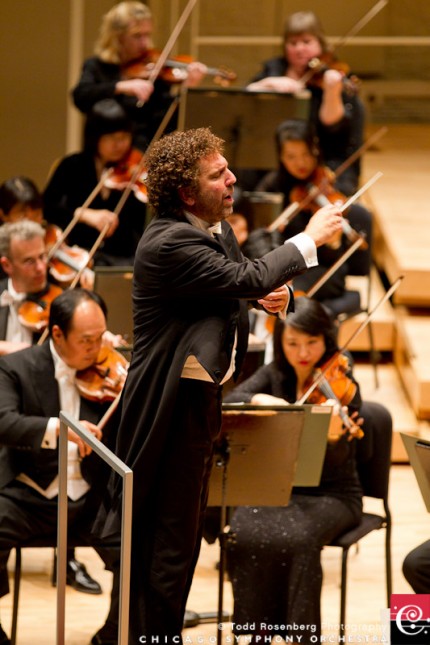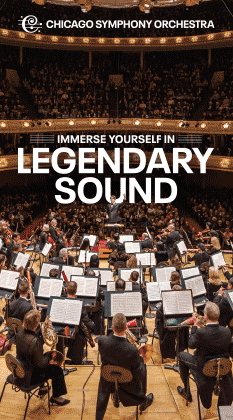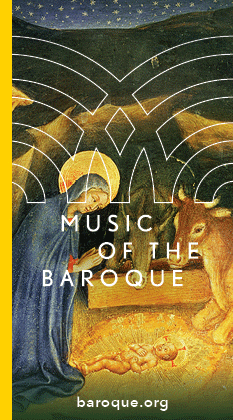Subbing for Muti, Asher Fisch makes an impressive CSO debut

The best-laid plans of maestro and men.
After Riccardo Muti’s sudden illness resulted in a conductor-less Chicago Symphony Orchestra gala last Saturday, the CSO staff then had to scramble to fill the podium slots for the next two weeks of concerts when the new music director cancelled his appearances.
Happily, they did so admirably. Pierre Boulez will return with a retooled Mahler program next week, and on Thursday night Asher Fisch made his CSO subscription debut in the scheduled lineup of Wagner, Chavez and Beethoven.
Fisch has been a regular presence at the Lyric Opera over the past decade where he has conducted Verdi, Puccini, and Johann Strauss Jr., and is currently in rehearsals for the upcoming performances of Un ballo in maschera.
Yet on the concert platform his local profile has been almost nonexistent, limited to a single appearance with the CSO at Ravinia.
For the offbeat Muti program that he inherited, Fisch acquitted himself superbly Thursday in his belated downtown debut, leading impressive performances that should earn him an invitation back under less fraught circumstances.
The Israeli conductor’s mentor is Daniel Barenboim, and, trained largely in Germany, Fisch clearly shares Barenboim’s taste for cornerstone Austro-German repertoire and the German symphonic tradition.
Yet Fisch is very much his own man, as demonstrated in Thursday’s bracing performance of Beethoven’s Symphony No. 3. With fleet tempos, light textures and firm rhythmic cut, Fisch’s Eroica seemed about as far removed from Barenboim’s heavy marmoreal readings as possible.
If anything, Fisch recalls another CSO music director, Sir Georg Solti, in his animated podium style as much as his taut, sharply rhythmic interpretations.
The conductor has clearly imbibed the historically informed performance practices of recent decades, as evident in the flowing, lightly sprung opening movement. Yet there was no lack of bite in accents and there was always a tensile strength undergirding the Viennese flavor of this performance.
The expansive funeral march was less deeply tragic than one often hears—more searching at a flowing tempo—yet none the worse for that, with plenty of punch at climaxes and a cumulative strength to the final bars, minus the Teutonic heaviness.
Indeed, what proved most impressive about Fisch’s Beethoven—besides the quite glorious playing of the orchestra—-was how organic and inevitable it felt. The conductor always showed a firm control of the long line and the broader span. The final variations segued from a piquant charm to imposing strength without employing agogic exaggeration or jarring accelerations to get there.
Fisch also showed himself a witty and engaging speaker. In his introduction to the first half of the concert, this long-experienced Wagnerian confessed that before Sunday he had never heard of Wagner’s Centennial March, which opened the concert.
The idea of Muti’s pairing of the two opening works, was to present two different takes on North America by composers from far-flung countries—Wagner from Germany and Chavez from Mexico.
It’s strangely comforting to realize that in between completing Tristan und Isolde and writing Parsifal, Wagner could write such a rotten piece of music as the Centennial March. A commission from his great advocate (and the CSO’s founder) conductor Theodore Thomas to mark the U.S. centennial in 1876, it may not be the worst piece Wagner ever wrote, but I’m damned if I can think of another one as bad.
With volume in inverse proportion to its quality, Fisch and the CSO players gave it their best in a vigorous and gleaming performance that wisely made no apologies for the unhealthy vulgarity.
Carlos Chavez’s Symphony No. 2 was programmed as part of Chicago’s Mexico 2010 celebration marking the nation’s independence.
While it’s always worthy to hear some of Chavez’s still-underrated music, it would have been even better to hear one of the Mexican composer’s other, more substantial six symphonies than this colorful if slight 12-minute work.
Reflecting the title, Sinfonia india, Chavez mined folk melodies from various Mexican Indian tribes—largely the Seris of Sonora and the Huicholes of Nayarit. Yet while the native influence is clear in the dance rhythms and uninhibited percussion, it’s also hard to avoid the feeling that Chavez’s great friend Aaron Copland had some influence in the simple pastoral expression of the central lyrical theme.
Fisch and the orchestra delivered a fizzing, brilliant performance with the riotous coda capped by playing of wonderfully sassy panache from Jay Friedman and his trombone colleagues.
The program will be repeated 1:30 p.m. Friday and 8 p.m. Saturday. cso.org; 312-294-3000
Posted in Performances







Posted Oct 09, 2010 at 12:04 pm by Roylene Gallas
I attended Open Rehearsals on Thursday morning. What a treat it was to experience Asher Fisch conducting. I was not aware of his talents previously so I was quite pleased to learn more about him. I can tell you, too, that Mr. Fisch was the subject of much favorable talk in the lobby of Symphony Hall immediately following the rehearsal. I love his energy because clearly loves what he does. The CSO could not have found a better interim conductor while Riccardo Muti recuperates. Let’s see more of Asher Fisch in the future and not just at the Lyric. Bravo!